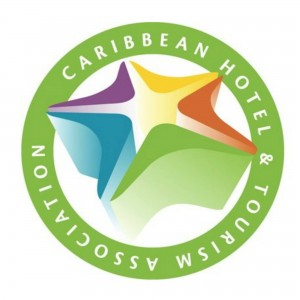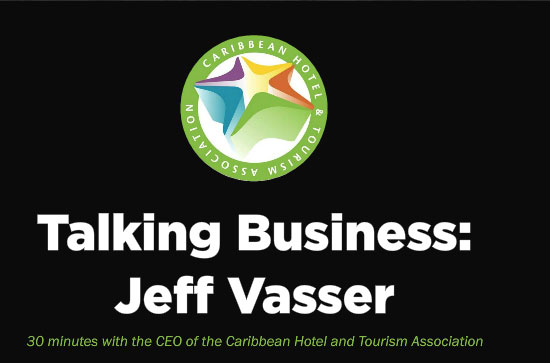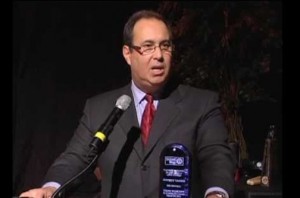Taking Business – Jeff Vasser: 30 minutes with the CEO of Caribbean Hotel and Tourism Association.
BUSINESS VIEW: Talk about the history of the organization – in terms of how it’s evolved, was this always the plan? Have things taken different directions based on circumstance or anything else?
JEFF VASSER: The market has changed a bit, and we’ve changed with it. In the old days, going back less than 10 years, we were known as the Caribbean Hotel Association, and what we are is an association of associations. We are made up of 33 individual national hotel associations, so they are our members, as well as individual hotels. Several years ago, we changed our name to the Caribbean Hotel and Tourism Association to better reflect the members that we represent – the other private sector, tourism, at least throughout the Caribbean; and that includes restaurants, a huge part of our membership base now, attractions and travel and tour operators on the islands. What we’re trying to do is make sure that everybody recognizes the strength of our industry, the strength and the importance of tourism to the individual islands and to their governments. And, certainly, to a degree, market what the Caribbean has – the top warm water destination in the world.
BV: What sort of membership numbers are you at and how has that changed over the recent past?
VASSER: We have over 600 individual hotel members, 33 countries’ national hotel associations that are members. That is down from our peak. In 2008, when the economy went south, people would stop traveling, it started in 2001 and then again in 2008, people stopped traveling and a lot of hotels had to drop out, a lot of hotels closed in those days. So we are down from our peak, but we are close to getting back to that number. We have about 300 allied numbers – those members are not hotels, but represent other factions of the tourism industry. And, my role, coming in, is to, we’ve been around for 52 years, oversee what the next 50 years will be. I’m in the process of assessing what our value proposition is to all of our members, what they want to see from us, what we can do and how do we deliver those services. The market has changed – the Internet has made it easier for buyers and sellers to get together – and what is our role in that?
Traditionally, it’s been putting together events where buyers and sellers get together. We need to make sure that we stay relevant and that we continue to market our region and our hotels and all of our members to the worldwide business community, as well as to the traveler. Something that’s new for us is a joint venture with the Caribbean tourism organization, CTO. What they are is our sister agency, of the public sector. They are made up of the ministers of tourism, and the governments’ tourism boards. Where we represent the private sector, they represent the public sector. Where we have a common interest is in driving more travel and people to the Caribbean. We formed a company called the Caribbean Tourism Development Company, and that’s relatively new. What we do now is run a website called CaribbeanTravel.com – and that’s a joint venture of our efforts. What we try to do is be a go-to source for travel information for the Caribbean – whether it be hotels, attractions or restaurants.
What we do, everyday, is load up more and more of our members, because they’re seeing the value of the clicks that we’re getting. Just in its first year, we had about 80,000 hits, 80,000 leads that were generated from that site. Half of those leads went to the destination’s page by itself and the other half went to individual hotels’ pages. We’re not a booking agent and we’re not looking to compete with those folks that already have their own booking agents, but what we do want to do is drive leads there. When somebody does a search for Caribbean travel, they’re going to come to our site. The next phase of that project is to create more and drive more traffic to the site by virtue of a paper-click campaign, as well as advertising that drives people to CaribbeanTravel.com. We recognize that people have other options, other islands and other beautiful destinations around the world where people can go that are as exotic as the Caribbean, but we certainly want to make sure that we take advantage of being so close to the mainland U.S. and our biggest market, which is South America.
BV: You mentioned members that were non-hotels – do you have a particular segment that’s grown the fastest? What do a majority of those entities tend to look like?
VASSER: When you get into those other segments you’ve got the attractions, which can be anything from a zip-line company to a water park. They’re very diverse in what they offer. I think the strongest segment we can go after to represent and we can provide value for is the restaurant industry. I don’t have to tell you, being in the industry, culinary tours, the growth of things like the Food Network and the spotlight it’s putting on individual chefs, individual restaurants and cuisines. What I’ve been amazed at so far is that you go to 33 different islands, and these are individual countries, everybody does breakfast different and I think we need to celebrate that. What we can do is do the same thing that we’ve done for hotels. I also think a segment that we really could make an impact on is small meetings, getting into the incentive market more, getting into those small corporate meetings and resorts, that’s what we can bring to the table. I think it’s restaurants and the culinary segment that’s really going to take us to the next level.
BV: Are there certain issues that are on the minds of the members? Obviously, coming out of the recession and getting themselves back to stability are huge for the ones that have made it through, but are there any other things that are pressing issues to the group as a whole?
VASSER: As you can imagine, 33 different countries, there are 33 major issues facing all of them. Collectively, energy costs are a huge issue that we need to face as a region. You think about individual islands, what it costs to generate electricity, water. A lot of the infrastructure that we take for granted here in the mainland U.S. with the grid system – they don’t have that there. They don’t have the critical mass that drives energy costs down. The cost per kilowatt-hour there is significantly different than what you would pay here on the mainland. So energy costs are a huge issue. Airlift is a huge issue – we need to bring more air service, supply, into the islands and it’s not just from the U.S. or from Latin America, but inter-island flights as well. There’s a great opportunity for us, especially in the off-season when someone from New York isn’t flying into St. Lucia, to make it easier for someone from one island to pop over to another one, without having to go through Miami or San Juan first. I think that’s a huge part.
And the last part is sustainability. Everybody knows that sea levels are rising and we need to make sure that the footprint of the individual islands, and the resorts, and the impact that we’re having on our communities, that we’re going to have something for the future generations. Everybody’s concerned about sustainability, everybody’s concerned about their operating costs, especially energy and airlift. I would say those are the three big ones.
BV: Are there certain destinations that you feel are going to be a lot more high profile a few years from now? A lot more popular than they are now? What are some of the emerging places that you’re starting to see more traffic?
 VASSER: From one angle, development, you’re seeing a huge amount of new development in St. Kitts and Nevis, but Sandals and their group are building properties all over the region. I think everybody has taken this opportunity to reinvest in their product, and I think the governments are very attuned to making development easier throughout the islands. What we need to do is make sure supply doesn’t exceed demand. From my point of view, what do we need to do to make the Caribbean more accessible from these emerging markets? Again, I’ll point to Latin America, but I’ll point to Asia as well. Obviously North America and Europe are already major markets for the region right now, but with how close we are to South America, it’s just a natural. I think you’re seeing growth throughout Central America and I think it’s an emerging market for us. In recent years, the past 15-20 years, there’s been growth of resorts along the Central American/Caribbean coast, so I think that’s an opportunity for all of us to pay attention to.
VASSER: From one angle, development, you’re seeing a huge amount of new development in St. Kitts and Nevis, but Sandals and their group are building properties all over the region. I think everybody has taken this opportunity to reinvest in their product, and I think the governments are very attuned to making development easier throughout the islands. What we need to do is make sure supply doesn’t exceed demand. From my point of view, what do we need to do to make the Caribbean more accessible from these emerging markets? Again, I’ll point to Latin America, but I’ll point to Asia as well. Obviously North America and Europe are already major markets for the region right now, but with how close we are to South America, it’s just a natural. I think you’re seeing growth throughout Central America and I think it’s an emerging market for us. In recent years, the past 15-20 years, there’s been growth of resorts along the Central American/Caribbean coast, so I think that’s an opportunity for all of us to pay attention to.
BV: In terms of ways that you engage your membership – what have been the ones that have had the most resonance? Have you had multiple events? Do you put out publications? How do you stay in contact and what has worked?
VASSER: That’s something that I’m assessing right now – how do we communicate better with our members. Right now, we put out monthly newsletters, we send out email blasts all the time and we just need to make sure we don’t get lost in the clutter, and how do we make sure what we’re providing is relevant and people want to see it. We’re working to redesign our website so members can go in and get a lot of information that they need – whether it’s information on travel statistics, things that they can use when talking to their own government or associations, information that perhaps will be great benchmarking opportunities. If somebody has an issue with local transportation, they can do a search on our website to find out who else has faced the same type of situation and how did they handle it.
Perhaps, think of it as having a collection or library of studies, where people can access it. I think that’s the type of information and service that we can best provide to our members, making it easier for them to find ways to improve their properties. For them, they want to improve and make more money, find easier and less expensive ways to buy product and bring product down. Those are the types of initiatives that I really want to start embracing. And, of course, finding ways to bring partners in, people that want to sell to our hotels, or partner with our hotels, services and products that they can provide. I want to provide an easier way for them to get a hold of our members. We’ve got a lot on our plate right now, but I’m excited about the opportunities.
BV: What do see happening in the next couple of years, next five years – if you can look out that far, what sorts of priorities do you have other than the ones you’ve already mentioned? How do you think things are going to evolve in the industry there between now and then?
VASSER: What I want to do is be the go-to source for information and assistance, and raise the visibility and relevance to our members. What I think that will do is obviously drive more members into our association. In the future, I’d love to expand past the 33 members – everybody that has a Caribbean post should be a member. There’s strength in numbers and we all have common interests, and if we work together as a region, we’ll be able to get a lot more done, rather than working on these things individually. Every country has its unique issues, but what we’re trying to find are those that are common to everybody.
I don’t know if it’s going to be 5, 10, or 20 years, but Cuba’s going to be back and they are going to drive a lot of attention back to our region, because they will be a novelty and we certainly want to be there to help them. What we all need to do is, again, help raise the profile of the region and make it easier to do business here, and ultimately, drive more visitors here.



 This information will never be shared to third parties
This information will never be shared to third parties